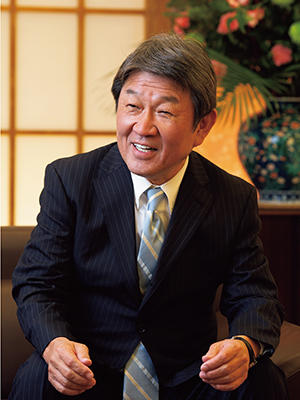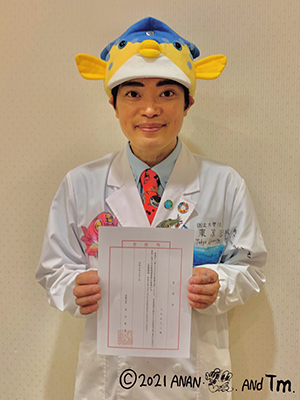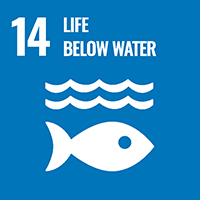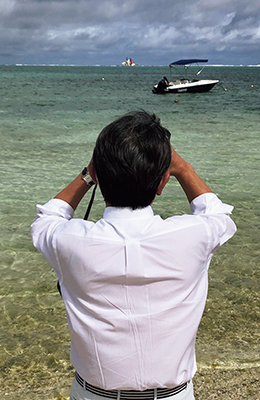Diplomatic Bluebook 2021
Chapter 3
Japan's Economic Diplomacy to Promote National and Global Interests
3 Fisheries (Whaling and Tuna, etc.)
As one of the major fishing countries and consumers of fishery products in the world, Japan, through international organizations, actively contributes to the proper conservation, management and sustainable use of marine living resources (see the Column on page 205).
In line with its position that cetaceans are a part of marine living resources that should be utilized in a sustainable manner based on scientific evidence, Japan has sincerely engaged in the dialogues in the International Whaling Commission (IWC) for over 30 years on the basis of scientific data collected. However, as it became evident that it is not possible in the IWC to seek the coexistence of States with different views between “sustainable use” and “conservation,” the original goals of the IWC, Japan withdrew from the International Convention for the Regulation of Whaling (ICRW) on June 30, 2019. In July of the same year, Japan resumed commercial whaling targeting large whales in territorial waters and its exclusive economic zone (EEZ). The whaling, which targets minke whales, Bryde's whales and sei whales, whose abundance has been confirmed, is conducted in a sustainable manner based on scientific evidence within the catch limits calculated in line with the method adopted by the IWC, which allows for the maintenance of the population level whereby whale resources will not be depleted even after 100 years of continuous whaling.
Japan has been contributing to the science-based sustainable management of whale resources in coordination with relevant international organizations, through participating as an observer in the IWC Scientific Committee in May 2020, conducting a non-lethal study of whaling resources in the Japanese Abundance and Stock-structure Surveys in the Antarctic (JASS-A), the IWC-Pacific Ocean Whale and Ecosystem Research (IWC-POWER), etc., and providing research results and catch information to the IWC and other international organizations.
As there is an increasing call for urgent actions by the international community against illegal, unreported and unregulated (IUU) fishing, Japan is promoting efforts to combat IUU fishing. In the leaders' declaration issued at the G20 Osaka Summit in 2019, where Japan served as chair, Japan took the initiative to state the following point in the declaration: “the importance of addressing IUU fishing for ensuring the sustainable use of marine resources and conserving the marine environment including biodiversity.” Through multilateral discussions and efforts including the adoption of the “Sustainable Fisheries Resolution” at the 75th UN General Assembly, Japan also urges non-signatory countries to accede to the Agreement on Port State Measures to Prevent, Deter and Eliminate Illegal, Unreported and Unregulated Fishing (PSMA), which establishes rules for port states to take measures against IUU fishing vessels, including denial of port entry
In the Central Arctic Ocean, while commercial fishing is unlikely to become viable in the near future, there have been concerns that unregulated fishing will begin as ice coverage in that area has diminished due to global warming. Consequently, ten states and organizations, including Japan and five states bordering the Arctic Ocean, signed the Agreement to Prevent Unregulated High Seas Fisheries in the Central Arctic Ocean in October 2018. As of the end of 2020, nine countries including Japan have signed the agreement.
As one of the largest tuna consumers, Japan has joined Regional Fisheries Management Organizations (RFMOs) for tuna, and leads discussions on strengthening conservation and management measures (CMM) at annual meetings and other occasions. With regard to the Pacific Bluefin tuna, at the 2020 meeting of the Northern Committee of the Western and Central Pacific Fisheries Commission (WCPFC), based on scientific knowledge concerning the adult fish stock recovery for example, Japan, same as in 2019, proposed an increased catch limit once again this year to an extent that a certain measure of achievement concerning its resource recovery target will be maintained. While some cautious comments resulted in the catch limit not being increased, revisions to the CMM were adopted and measures allowing an increase in the carryover limit for the portion of unused catch from 5% to 17% and a transfer of the small fish catch to the large fish catch were extended for one year. The total allowable catch (TAC) for Atlantic tuna has been increased based on the state of resource recovery in recent years, and email discussions, held upon the cancellation of the annual International Commission for the Conservation of Atlantic Tunas (ICCAT) in 2020, led to the decision to maintain the same level of the 2020 TAC for 2021, as well. Japan withdrew from the General Fisheries Commission for the Mediterranean (GFCM) on October 31, 2020 due to Japanese fishing vessels not having operated in the Mediterranean Sea since 2010 and conservation and management measures concerning tuna in the Mediterranean Sea, in which Japan has an interest, have been adopted in recent years only by ICCAT.
With respect to Pacific saury, the first fishing operations took place in accordance with fishing regulations adopted at the 5th Annual Session of the North Pacific Fisheries Commission (NPFC), held in 2019. In 2020, as the media reported extensively on record poor catches of and high prices for Pacific saury, there was a renewed interest in the importance of using fisheries resources sustainably, changes in the marine environment, and the sustainability of Japan's fishing industry. Measures for more robust resource management will be needed at the future sessions.
As for Japanese eel, same as 2019, at the informal consultation on international cooperation led by Japan in June, Japan, the ROK and Chinese Taipei agreed to cooperate toward establishing limits for glass eel into aquaculture ponds and improving traceability in international trade.
On February 1, 2021, the Ministry of Foreign Affairs appointed SAKANA-KUN as the “Goodwill Ambassador for Sustainable Oceans and Fish.” Going forward, SAKANA-KUN will take on the role of communicating, both in Japan and abroad, Japan's activities toward realizing sustainable and healthy oceans, including fishery resources. This column features a dialogue between Foreign Minister Motegi and SAKANA-KUN.
1. Appointment as the Goodwill Ambassador for Sustainable Oceans and Fish
Foreign Minister Motegi: Congratulations on your appointment as the Goodwill Ambassador for Sustainable Oceans and Fish. I hope that you will widely communicate Japan's contribution to sustainable fishery.
SAKANA-KUN: It is my honor to be appointed as the Goodwill Ambassador for Sustainable Oceans and Fish! I would like to convey, from a major fish-consuming nation of Japan widely to the world, what is important to live in harmony with the fish that we love, while preserving the beautiful seas.
 Foreign Minister Motegi
Foreign Minister Motegi(Photo: Watanabe Shigeki)
 SAKANA-KUN holding the letter of appointment
SAKANA-KUN holding the letter of appointment2. Japan's diplomatic role and initiatives as a major fishery nation
SAKANA-KUN: Japan is a major fishery nation that is surrounded by beautiful seas and is endowed with wonderful rivers and lakes, and many species of fish. I believe that fish is an indispensable part of the Japanese diet and food culture.
Minister: Japanese people have enjoyed the blessings of the sea since a long time ago. “Sustainable use of fishery resources,” which means that we can continue fishing in a stable manner going forward, is an important diplomatic issue linked to biodiversity and securing stable food supplies. Japan, as a major consumer country of fishery products, plays a significant role in the international community as a responsible fishery nation.
SAKANA-KUN: Great changes are now taking place in the environment surrounding fish. It is becoming increasingly difficult to catch some species that we have been able to catch so far, and the volume of the catches is declining. One of the hot topics that came up last year was the record low catches of Pacific saury, which is an indispensable part of the Japanese diet.
Minister: We often hear the word “sustainable” in relation to fisheries and the sea. The Sustainable Development Goals (SDGs) are now becoming a keyword not only in the international community, but also among private companies in Japan, and Japan is actively promoting the SDGs. The same goes for the field of fisheries.
SAKANA-KUN: Goal 14 of the SDGs aims to realize healthy oceans. As the Goodwill Ambassador, I would like to participate actively in activities toward this goal! I am concerned about the volume of fish we catch, because fish consumption is increasing around the world. What are Japan's initiatives in the international community to contribute to sustainable fishery?
Minister: Since overfishing is a global problem, we are working to realize the sustainable use of fishery resources based on scientific evidence. One of these initiatives is our contribution to the rule making process for sustainable fisheries through Regional Fisheries Management Organizations (RFMOs). Even for species that the Japanese people are very familiar with, such as tuna species, mackerel species, Pacific saury, and squid, we discuss their catch quota and fishery methods in the RFMOs. Japan is member of 13 RFMOs, and actively engaged in international efforts toward sustainable management of fishery species through these organizations.
 Logo of SDGs Goal 14 (Photo: United Nations Information Center)
Logo of SDGs Goal 14 (Photo: United Nations Information Center)SAKANA-KUN: Wow, that many! I have heard that in the International Commission for the Conservation of Atlantic Tunas (ICCAT), one of the RFMOs, Japan played a central role in the efforts made by relevant countries to restrict the catches of Atlantic bluefin tuna in order to curb their declining population. Thanks to their efforts, the population of Atlantic bluefin tuna has increased. For fish with declining populations due to overfishing, diplomacy can make fishery sustainable and contribute to conserving fish and healthy oceans for future generations.
Minister: Exactly. Similar efforts are being made to restrict the catches of Pacific bluefin tuna to enable resource recovery.
To conserve fishery resources in the future, it is also important to tackle “illegal, unreported and unregulated (IUU) fishing.” For example, on my visit to Tunisia last December, I conveyed that Japan would provide Tunisia with two vessels for fishery surveillance to combat IUU fishing. The Head of Government and the Secretary of State of Tunisia expressed their great appreciation for Japan's initiatives.
SAKANA-KUN: That is wonderful. On my previous visit to Senegal, I was really impressed to see the sites where Japan's support and technologies are contributing to the development of fishery industries overseas. Fish is an important food resource around the world, and that is why it is important to provide support to developing countries.
3. What we can do to conserve the healthy oceans
SAKANA-KUN: SDGs Goal 14 also aims to prevent marine pollution and protect marine ecosystems. In recent years, the marine environment has undergone significant changes, such as the rise in seawater temperature and its acidification. Marine plastic litter is an especially serious problem. I once participated in a study to investigate how much plastic litter is floating in the sea. I was flabbergasted when our net filled up with plastic litter in just about 20 minutes. This is very worrying as marine organisms are sensitive to changes in their environment.
Minister: At the G20 Osaka Summit in June 2019, Japan shared the “Osaka Blue Ocean Vision,” which aims to reduce additional pollution by marine plastic litter to zero by 2050. Under the “MARINE Initiative” established to realize this vision, Japan is providing support for efforts to improve waste management in developing countries through ODA. As a part of this, Japan will provide training for 10,000 officials engaging in waste management by 2025.
SAKANA-KUN: How amazing! One of the ways in which marine plastic litter is generated is when litter on land flows into the sea through rivers and waterways. Therefore it is important for all individuals across the world to put effort into reducing waste in their daily lives, such as by using their own reusable bags and bottles, and by recycling waste. I hope that we can spread this vision from Japan to the world!
 Foreign Minister Motegi inspecting the coastal area in Mauritius
Foreign Minister Motegi inspecting the coastal area in MauritiusCould you tell us about the activities for conserving the marine environment that have left on you a strong impression since you assumed office as Minister?
Minister: In December last year, I visited Mauritius, where I inspected the extent of damages from the oil spill caused by the grounding of the bulk carrier “WAKASHIO.” Through tireless efforts by the Government and the people of Mauritius and hard work of relevant parties, water in the surrounding sea had become visibly cleaner than when the accident occurred. This left a strong impression on me. I heard that the oil removal work had mostly been completed, but Japan will continue to work closely with the relevant parties so that Mauritius can regain its beautiful natural environment as well as its prosperous economy and life as soon as possible.
SAKANA-KUN: The world is connected by oceans. I have realized anew how important it is for the world to put concerted effort into conserving fish and healthy oceans, in order to achieve SDGs Goal 14. Individual efforts are also important, including for the marine plastic litter issue. As the Goodwill Ambassador for Sustainable Oceans and Fish, with the aim of achieving SDGs Goal 14, I will communicate the importance of sustainable use of fishery resources!

